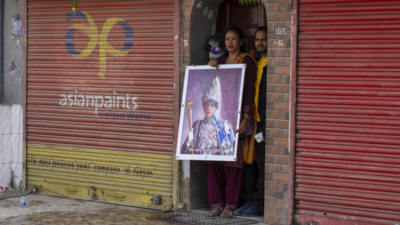KATHMANDU: Swati Thapa, central committee member of Rastriya Prajatantra Party (RPP), weighs her words carefully. “The people want the king back,” she says. “Not as a ruler. As a guardian. A stabilising force. And they want Nepal restored as a Hindu rashtra. These are not political slogans anymore – they’re the people’s survival instincts.”
RPP was formed in 1990 following the restoration of multi-party democracy. It began with four seats in the 1991 elections and has maintained its presence, often playing the kingmaker. In 2022, RPP secured 14 of 275 seats in the parliament. The party was part of the current coalition govt until Feb 2023.
Her party has long championed these demands: the return of a constitutional monarchy, the removal of the country’s “expensive” federal structure, and reinstatement of Nepal as a Hindu state. The return of Nepal as a Hindu rashtra is central to RPP’s vision. “This country became secular without asking its people. That’s the truth,” she said. “We believe more than 80% of Nepalis still want a Hindu state.”
Thapa brushes off the concern that RPP’s agenda might alienate moderates or minorities. “This doesn’t mean discrimination. It means protection of what’s ours. We respect every religion. But we will not lose ourselves in the process. Why must we keep apologising for our roots?” she said. She alleges that “coerced” conversions – particularly in remote and poor areas – are altering the cultural fabric of the country. “Foreign aid is being used to change who we are,” she said, naming Western agencies as enablers.
Former king Gyanendra Shah’s re-emergence has been a flashpoint in the country. She confirmed that RPP maintains contact with the royal family. On the tricky subject of succession – especially given public unease with Gyanendra’s son, Paras – Thapa is straightforward. “We’ve said clearly: succession should not be automatic. The next monarch should be chosen based on trust and capacity…” This came even as RPP said Paras has told the party that he doesn’t want to be king.



